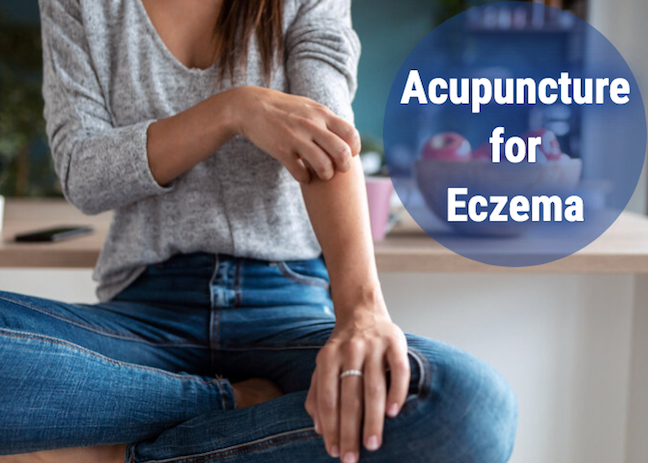Acupuncture is a beneficial treatment for eczema, a common skin condition causing itchy, dry skin as well as red rash on various parts of the body. According to the National Eczema Association, 31.6 million people in the United States have some form of eczema, and 18 million of those people have atopic dermatitis, the most common type of eczema. Although there are treatment options for eczema, there is no cure, which means the more options that patients have to treat their eczema the better.
Eczema in Western Medicine
Although eczema is a skin condition, the symptoms associated with the condition can be triggered by a variety of things. Utilizing home treatments as well as prescription plans is the western medicine variation of managing the eczema symptoms.
Eczema Symptoms:
- Dry/sensitive skin
- Itchy skin
- Swelling
- Scaly, leather-like patches of skin
- Crusting/oozing skin
- Red rashes/patches
- Bumps on the skin
These are the most common potential symptoms for eczema, however, it is important to note that eczema symptoms are different with everyone. Eczema is a chronic condition, but it often has waves with flare ups to symptoms going away entirely.
Eczema often develops in childhood, and will often go away as the child grows, however, some children will experience eczema into adulthood. Less common is developing eczema as an adult, although it does happen. There can be a variety of causes, and many times, it can indicate the patient having other conditions.
Causes of Eczema:
- Genetics – if there is a history of eczema or dermatitis in the patient’s family. This also puts them at a higher risk if there is a history of seasonal allergies, asthma, or other allergies.
- Environment – exposure to things in our environment can be detrimental to our skin. Some of these environmental irritants include air pollutants, tobacco smoke, dry atmosphere, harsh climate, low humidity, work environment, and more.
- Immune System – the body’s overreaction to allergens and irritants can inflame the skin and cause eczema.
- Stress – increased stress can make eczema and various other skin irritants worse
There are also many conditions that are often alongside eczema including allergies, asthma, anxiety, depression, and sleep loss.
Acupuncture & Eczema
Acupuncture for eczema works by controlling the immune system’s response to its triggers reducing flare-ups, and treating lesions and itching. More specifically, it can restore the skin barrier, improve overall skin health, and relieve the discomfort of eczema.
Acupuncture Points for Eczema:
- LI4 – relieve inflamed, red, irritated skin
- LV3 – improve circulation, calm the nervous system, alleviate stress
- SP10 – relieve inflamed, red, itchy skin
- SP6 – relieve inflamed, irritated, red skin
- LI11 – relieve scaly, itchy, dry skin, and clear heat
- ST36 – alleviate depression, pain, and improve well-being
There is promising research that shows the benefits of acupuncture for the treatment of eczema symptoms.
Acupuncture for Eczema Research:
- Traditional Chinese Medicine for Food Allergy and Eczema, 2021:
- The object of this study was to outline encouraging evidence for traditional Chinese medicine for food allergy and eczema.
- Information was pulled from published literature from the PubMed database that were relevant to traditional Chinese medicine for food allergy and eczema.
- Findings from this study showed that acupuncture reduced wheal size, itchy skin, and allergic reaction.
- The object of this study was to outline encouraging evidence for traditional Chinese medicine for food allergy and eczema.
- Acupuncture Compared with Oral Antihistamine, 2012:
- The object of this study was to determine if acupuncture had the same or better effect on atopic dermatitis as antihistamine itch therapy (certirizine).
- 20 patients were evaluated with allergen-induced itch with atopic dermatitis. They were evaluated after several interventions in separate sessions including preventive and abortive verum acupuncture, cetirizine and corresponding placebo, placebo acupuncture, placebo cetirizine pill, and no intervention.
- The study found both acupuncture and cetirizine were found to be significantly more beneficial compared with placebo.
- This study concluded that both acupuncture and cetirizine reduced itch in patients with atopic dermatitis compared with placebo. It also found that the timing of acupuncture application was important since acupuncture had the most significant effect on itch.
- The object of this study was to determine if acupuncture had the same or better effect on atopic dermatitis as antihistamine itch therapy (certirizine).

